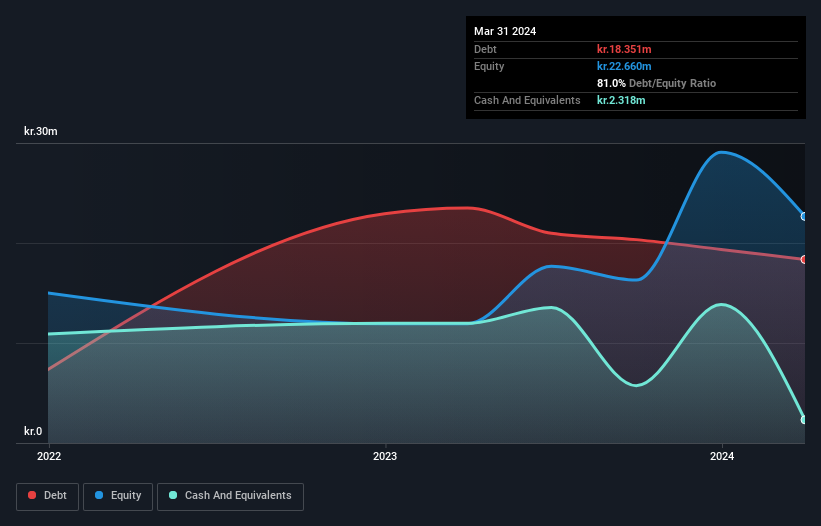
The external fund manager backed by Berkshire Hathaway's Charlie Munger, Li Lu, makes no bones about it when he says 'The biggest investment risk is not the volatility of prices, but whether you will suffer a permanent loss of capital.' So it might be obvious that you need to consider debt, when you think about how risky any given stock is, because too much debt can sink a company. Importantly, Ennogie Solar Group A/S (CPH:ESG) does carry debt. But is this debt a concern to shareholders?
When Is Debt Dangerous?
Debt assists a business until the business has trouble paying it off, either with new capital or with free cash flow. Ultimately, if the company can't fulfill its legal obligations to repay debt, shareholders could walk away with nothing. However, a more common (but still painful) scenario is that it has to raise new equity capital at a low price, thus permanently diluting shareholders. Of course, debt can be an important tool in businesses, particularly capital heavy businesses. When we think about a company's use of debt, we first look at cash and debt together.
See our latest analysis for Ennogie Solar Group
What Is Ennogie Solar Group's Debt?
As you can see below, Ennogie Solar Group had kr.18.4m of debt at March 2024, down from kr.23.5m a year prior. However, it also had kr.2.32m in cash, and so its net debt is kr.16.0m.

How Strong Is Ennogie Solar Group's Balance Sheet?
The latest balance sheet data shows that Ennogie Solar Group had liabilities of kr.23.5m due within a year, and liabilities of kr.16.8m falling due after that. On the other hand, it had cash of kr.2.32m and kr.17.3m worth of receivables due within a year. So its liabilities total kr.20.7m more than the combination of its cash and short-term receivables.
Since publicly traded Ennogie Solar Group shares are worth a total of kr.337.0m, it seems unlikely that this level of liabilities would be a major threat. But there are sufficient liabilities that we would certainly recommend shareholders continue to monitor the balance sheet, going forward. The balance sheet is clearly the area to focus on when you are analysing debt. But you can't view debt in total isolation; since Ennogie Solar Group will need earnings to service that debt. So if you're keen to discover more about its earnings, it might be worth checking out this graph of its long term earnings trend.
In the last year Ennogie Solar Group wasn't profitable at an EBIT level, but managed to grow its revenue by 14%, to kr.82m. That rate of growth is a bit slow for our taste, but it takes all types to make a world.
Caveat Emptor
Over the last twelve months Ennogie Solar Group produced an earnings before interest and tax (EBIT) loss. To be specific the EBIT loss came in at kr.7.7m. Considering that alongside the liabilities mentioned above does not give us much confidence that company should be using so much debt. Quite frankly we think the balance sheet is far from match-fit, although it could be improved with time. However, it doesn't help that it burned through kr.27m of cash over the last year. So in short it's a really risky stock. There's no doubt that we learn most about debt from the balance sheet. But ultimately, every company can contain risks that exist outside of the balance sheet. For instance, we've identified 3 warning signs for Ennogie Solar Group (2 make us uncomfortable) you should be aware of.
Of course, if you're the type of investor who prefers buying stocks without the burden of debt, then don't hesitate to discover our exclusive list of net cash growth stocks, today.
Valuation is complex, but we're here to simplify it.
Discover if Ennogie Solar Group might be undervalued or overvalued with our detailed analysis, featuring fair value estimates, potential risks, dividends, insider trades, and its financial condition.
Access Free AnalysisHave feedback on this article? Concerned about the content? Get in touch with us directly. Alternatively, email editorial-team (at) simplywallst.com.
This article by Simply Wall St is general in nature. We provide commentary based on historical data and analyst forecasts only using an unbiased methodology and our articles are not intended to be financial advice. It does not constitute a recommendation to buy or sell any stock, and does not take account of your objectives, or your financial situation. We aim to bring you long-term focused analysis driven by fundamental data. Note that our analysis may not factor in the latest price-sensitive company announcements or qualitative material. Simply Wall St has no position in any stocks mentioned.
About CPSE:ESG
Ennogie Solar Group
Develops, manufactures, and sells building-integrated solar roofs and energy systems in Denmark, Germany, and internationally.
Adequate balance sheet very low.
Market Insights
Community Narratives



